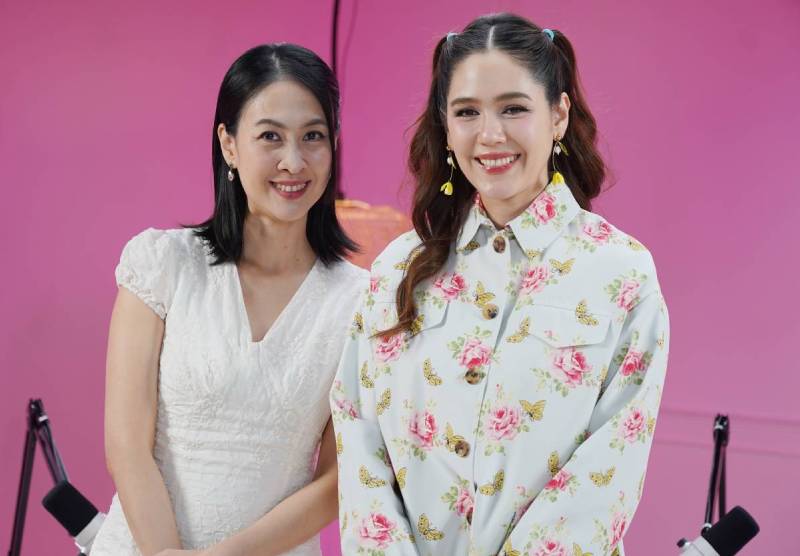This week on On the Way with Chom, we’ll share knowledge about how to eat a plant-based diet without failing. We’ll address some of the misconceptions surrounding plant-based diets among Thais, with Dr. Fon Prapimporn, a nutrition specialist, and share tips on how to eat a plant-based diet that’s truly sustainable and healthy for Thais without having to force yourself.
How are Plant-Based and Vegan similar or different?
Dr. Fon: The term “Plant-Based” is a general term. For example, “Plant” refers to plants, while “Plant-Based” refers to people who primarily eat vegetables. Now, in Thai society, there are many different preferences, such as vegetarianism, veganism, and veganism. “Vegetarianism” refers to the practice of not eating animal protein at all. Vegetarians don’t eat meat but still consume dairy products, eggs, and cheese. They are further divided into: lactovogue, which doesn’t eat meat but eats milk; ovo-vegetarian, which doesn’t eat meat but eats eggs; and lacto-ovovegative, which is similar to vegetarianism in Thailand, which means not eating meat, pork, chicken, fish, or seafood, but can eat eggs, milk, cheese, and yogurt. Veganism is similar to vegetarianism, but vegetarianism stipulates a cultural rule that one must not eat vegetables with strong odors.
But veganism is more of a way of life. In addition to not eating animals, one must also avoid animal products, such as honey, milk, and dairy products. It can also extend to lifestyles like not using leather. What’s trending on social media right now, or what we’re talking about, is the term “Flexitarian.” This term has been around for a few years. It comes from the words “Flexible,” which means flexible, and “Vegetarian,” which means a flexible vegetarian. Personally, I think it’s similar to the term “Plant-Based” that we’re talking about today. It means that the person primarily eats vegetables and fruits, but they can still eat meat of any kind. However, their meat intake may range from only once in a while to eating meat every day but less. So, it’s relatively easy to do and seems like a relatively easy adjustment for those who are starting to become interested in Plant-Based and want to increase their vegetable intake.
There will be a lot of debate, including from people who were ex-vegans or plant-based, who say their health isn’t any better than the average person’s, or even worse, some might say.
Dr. Fon: It’s true that eating vegan or vegetarian doesn’t always mean you’re healthy. Sometimes people feel that simply cutting out meat from their diet will improve their health, but that’s not always the case. So, in medicine, if we look at data, they compare people who eat a plant-based diet into groups called Healthy Plant-Based and Unhealthy Plant-Based. Healthy Plant-Based is a whole food, real food diet, with unpolished grains, vegetables, fruits, nuts, and dried beans. Unhealthy might feel similar to the vegetarian festival.
What we might call special protein, fried agricultural products, sweet drinks, soft drinks, French fries, this might also be Vegan. It will be classified as Unhealthy Plant Based Diet. They found that people who eat Unhealthy Plant Based Diet may actually have worse health than those who eat Unhealthy but not Plant Based as Animal Base. But the group that will benefit is the group that eats Healthy. They will also benefit from the group that eats Whole Food Real Food Plant Based Diet, which means they have to eat real vegetables from grains like this. Whereas in the study, it is not Vegan. It will be like Flexitarian, which means they still eat meat, but they will eat more vegetables. Meat, fish, pork, beef, anything can still be eaten.
As far as research is concerned, what kind of diet can actually be followed in a sustainable way and is good for your health?
Dr. Fon: When it comes to medical research, every specialist acknowledges that there’s real evidence that eating this way can lead to longevity and reduce the risk of heart disease and stroke. Everyone thinks of the Mediterranean diet. It’s derived from foods from countries surrounding the Mediterranean Sea. People in that region typically eat a plant-based diet, but they don’t eat vegetarian or vegan. They do eat fish and red meat, but in small amounts. So, people might think it’s not plant-based. They might misunderstand that plant-based diets are vegetarian, but in medical terms, they’re considered plant-based.
But it’s a plant-based diet that’s not too strict. It’s a diet that’s been shown to be healthy, primarily because it’s plant-based. Protein comes from fish and chicken, which are low in fat. They also eat red meat, but probably no more than once or twice a week. They consume good fats from cold-pressed olive oil and nuts. Importantly, beyond food, they’re also involved in physical activity. They’re active, walking all day, and they have good relationships with their family. So, this is something that might indicate that food is the main health factor, but in other aspects, lifestyle can also help reduce cardiovascular disease, inflammation, and fluctuations in blood sugar levels. Diabetes is also quite good information.
People who follow health issues will also be concerned with cooking oils. Olive Oil, a lot of research has been done on Extra Virgin Oil. It’s like every textbook recommends it, but this isn’t our culture. But what if it were for a Thai family?
Dr. Fon: If we take olive oil, which is similar to olive oil, we will know that its advantages are: 1. Cold-pressed; 2. It contains monounsaturated fatty acids, Omega 9, called oleic acid. It is also high in vitamin E. So if we look at something similar and it is a Thai oil, people may not be familiar with it, but there is tea seed oil. The seeds are imported from China but grown in Thailand. The factory processes it in Thailand. Cold-pressed olive oil has 70% oleic acid, which is Omega 9. Tea seed has about 70-80%, which is similar. But if we take another one, but it might not be a Thai product, which is avocado oil, because 1. They like the cold-pressed process; 2. Avocado oil has a not-so-strong aroma, making it suitable for cooking that doesn’t require the aroma and flavor of olives.
Is the number 1 common problem among people who eat Plant Base likely related to protein?
Dr. Fon: Yes, imagine during the vegetarian festival. Every food we see looks so delicious. But most of it is made up of flour and oil. Some of the food we eat might be unhealthy plant-based because it might only contain flour, oil, sugar, salt, and not enough protein.
There are still Plant Based Diets that you haven’t heard of. What is the Dash Diet and the Mind Diet?
Dr. Fon: The Dash Diet, in full, stands for Dietary Approaches to Stop Hypertension. This means it’s a diet designed to lower blood pressure. It’s also plant-based, and similar in that it emphasizes vegetables and low-fat meats. However, its oils are generally unsaturated oils, not olive oil. Therefore, they’re similar. It also emphasizes eating dairy products, which are low-fat dairy products. If it’s Mediterranean, it’s dairy products like cheese and yogurt. If it’s Dash, it’s low-fat dairy products, which are any dairy products that are low-fat.
This is actually quite similar. It sounds similar, but the main difference is the oil. It’s lower in fat than the Mediterranean diet, maybe higher in fat, but it’s good fat. This diet is designed to lower blood pressure because eating a lot of vegetables will lower blood pressure because it contains fiber and potassium. And when we eat it together with limiting salt, which is Dash plus limiting salt, this will have a better effect on lowering blood pressure levels. It’s one of the eating patterns that’s called okay. Now, there are also people who say it’s good, Dash is good, so let’s put them together. When you put them together, it becomes the Mind Diet. It’s a little different from the Mediterranean diet in that it says that eating it won’t deteriorate your brain.
When it comes to fruits and vegetables, they tend to focus on green, leafy vegetables because they may contain flavonoids, which can reduce inflammation and fight free radicals. Fruits tend to focus on berries, which are good because they’re low in sugar and high in antioxidants. However, they’re rare and not readily available to Thais. In Thailand, we have mulberries and gooseberries, which have similar compounds. They’re colorful fruits that contain powerful antioxidants that reduce inflammation and fight free radicals. These can potentially reduce the buildup of amyloid plaque or tau protein, which are known to cause dementia. So, if you eat a similar pattern, there’s data that suggests memory deterioration may be slowed.
I’d like the doctor to recap how to choose a plant-based diet that’s truly healthy.
Dr. Fon: Actually, the Plant-Based Diet comes first. We don’t necessarily have to be vegetarian or vegan. We can eat more vegetables and slightly reduce the amount of meat we eat. This is called a Plant-Based Diet. The most beneficial way to improve your health is to choose whole foods. Plant-Based foods are real, high-quality, and minimally processed foods. If you choose to eat healthy, you need to consider whether you’ll be happy doing it in order to do it for a long time. This is something everyone should consider: if we choose to eat a certain type of food, it must make us healthy and lastingly happy. Otherwise, we’ll just stop after a short period of time. If you’re going to start with a Plant-Based Diet, you don’t need to set anything up too much. It could be as simple as one day or one week. Try a Plant-Based diet with one meal of plant-based protein. For example, if you want something simple, say one day a week, say Meatless Monday. We can start from that point. This might be more suitable for some people who already do IF. For breakfast, choose something that might not contain meat, like plant-based protein or eggs, and reduce animal meat. This is still considered okay. It’s a good starting point.





